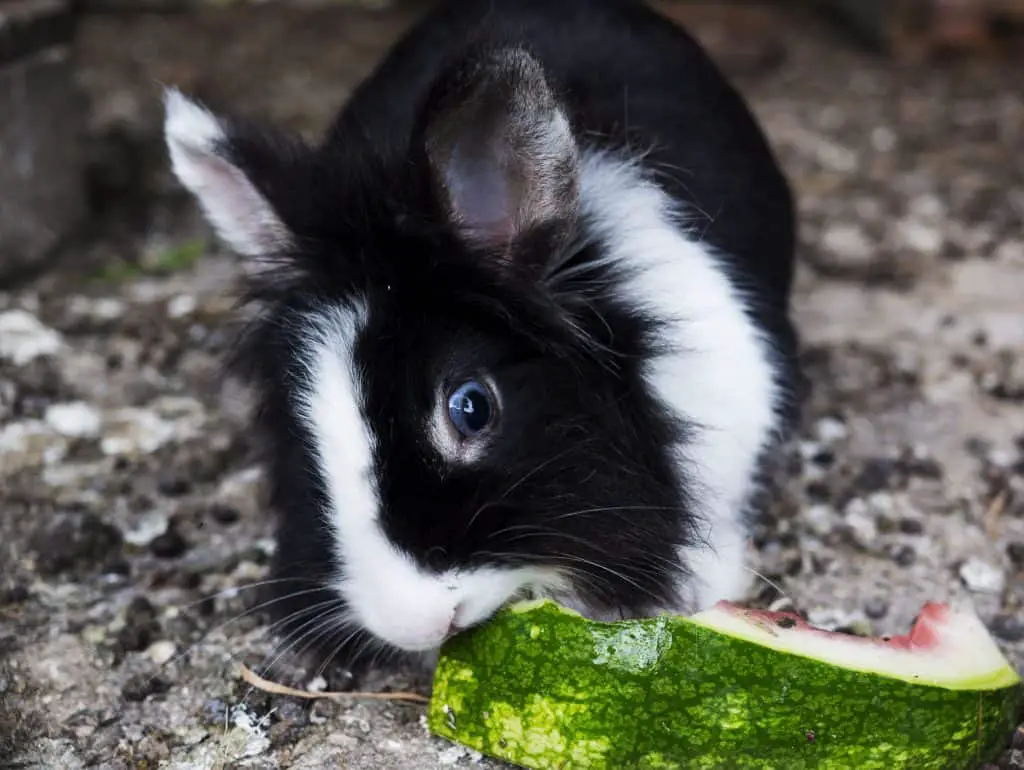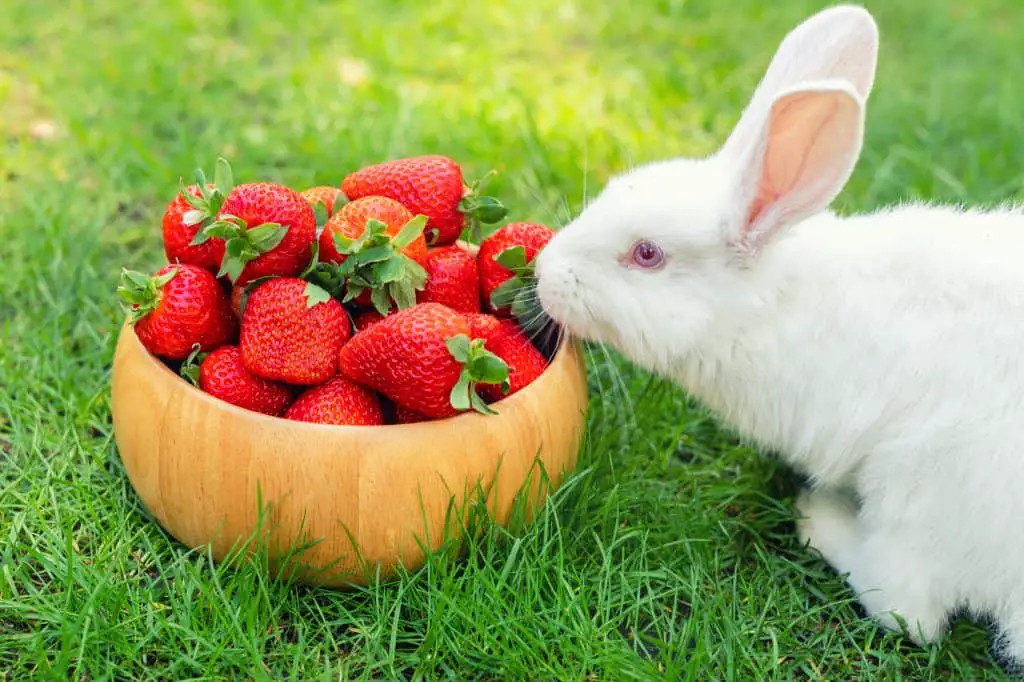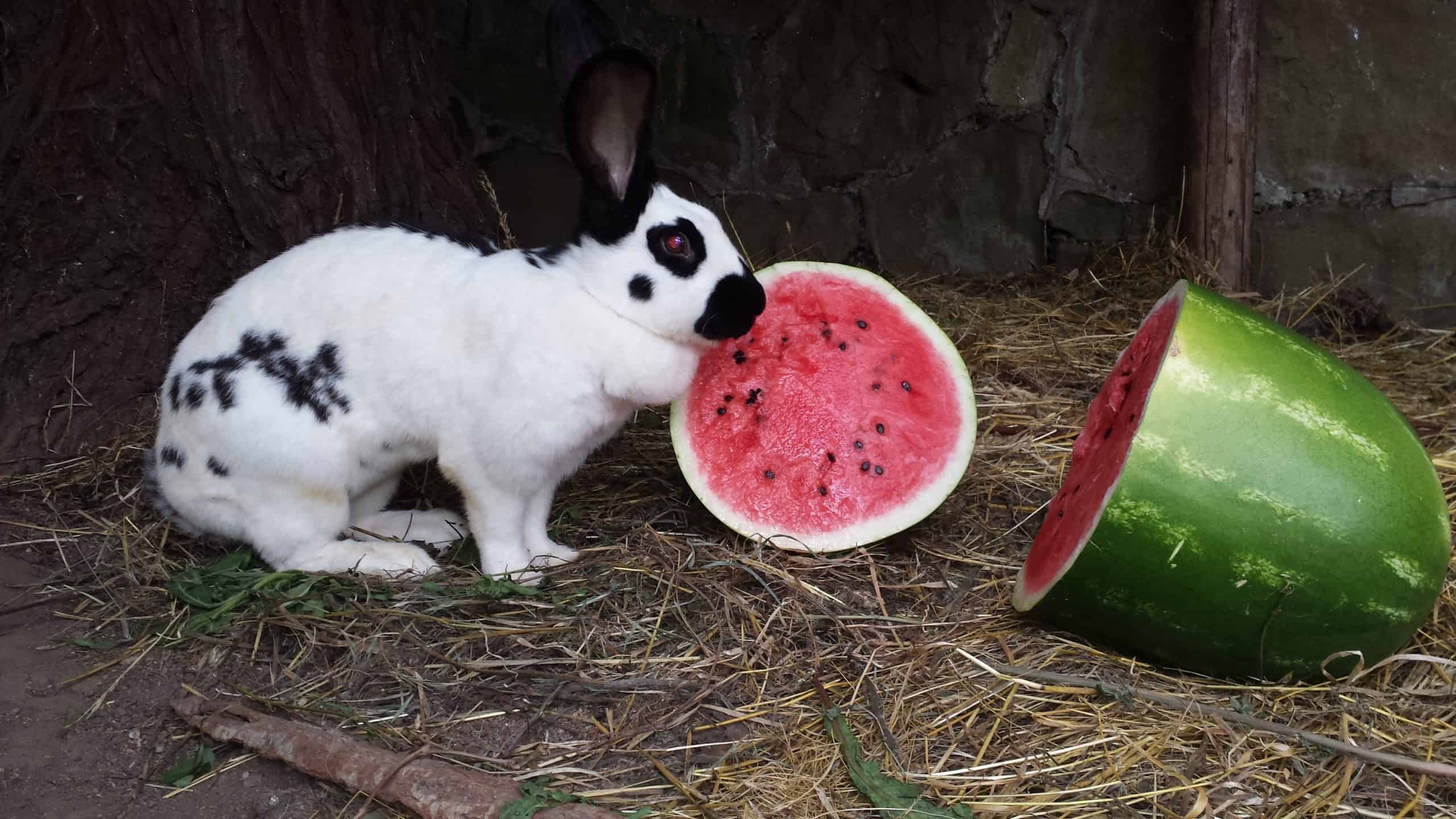As pet rabbits owners, we are always looking for new dietary additions, to add to our pet rabbit’s food repertoire. Some fruits have the added benefit of being very refreshing and you may be wondering whether rabbits can eat watermelon. There are several types of watermelons and all of them are quite safe for rabbit consumption. So if you buy a watermelon, both you and your rabbit can have a treat together! In this article, we will take an in-depth look at the watermelon, and if your pet rabbit should be enjoying this juicy fruit.
Can rabbits eat watermelon?
Yes, rabbits can have watermelon. It is not toxic to their system. However, watermelon has high sugar content. Your rabbit should not have large amounts of sugar. Pet rabbits are at risk for obesity if their diet has too much sugar in it. As you may know by now, It is recommended that 80% of your pet rabbit’s diet be hay/grass. It is crucial to their digestive health. The remaining 20% of a rabbit’s diet consists of fruits, vegetables, and pellets as a supplement. Pellets are optional, not all pet owners give their rabbits pellets if they believe that their diet is sufficiently balanced. Vegetables and fruits in your pet rabbits diet add the minerals and vitamins that your bunny needs for optimal health. However, fruits, in general, tend to have reasonably high sugar content. As such, it should be offered to pet rabbits only as treats.
Can rabbits eat watermelon skin?
Rabbits can have the skin or rind of the watermelon. In fact, it may be a healthier option than the juicy red part of the fruit. There is very little sugar in the skin. It also a great source of fiber which as you know is essential for healthy digestion. The skin is rich in citrulline amino acid. It is made up of the white part and the green part. Both are quite safe for your rabbit. Simply, cut the skin up into small manageable pieces. This way you eliminate the chance of the skin being a choking hazard. Your rabbits will enjoy the texture of the skin. They will love the crunchiness.
Are watermelon seeds safe for rabbit consumption?
No, they are not really safe. If you are going to give some watermelon to your rabbit, I suggest that you remove the seeds first before serving it to them. You can pick them out with your fingers or use a spoon. Pet rabbits have very sensitive digestive systems. Unfortunately, seeds can cause intestinal tract obstructions. If this occurs, you may notice that your rabbit is unable to have a bowel movement. i.e constipation. He may appear listless and lacking energy. Intestinal issues can make your pet rabbit quite ill. If this occurs, it is imperative that you get your rabbit to a veterinarian as soon as possible.
How should I serve my pet rabbit watermelon?
You should cut your melon in half. Then cut a modest slice. You should remove the red juice fruit away from the rind or skin. You can cut or cube it into manageable pieces. Lastly, meticulously remove all of the seeds before placing it into your rabbit’s feeding tray or bowl. If the watermelon is particularly juicy, some of the juice may get on your rabbit’s fur. So, you may have a bit of tidying up to do after this treat. You can have a damp washcloth or rag at hand to wipe around your rabbit’s mouth and any spill on the rabbit’s fur.
How much watermelon can I feed my pet rabbit?
Watermelon is not an everyday treat for rabbits. Just as the word treat suggests, it should be served sparingly. You can offer your pet rabbit watermelon twice a week. With regard to quantities, you can use your rabbit’s body weight as a guide. 1 tablespoon for every 2 pounds of your rabbit’s weight is acceptable. This way you can keep portions safe.

Which type of melon is better for pet rabbits?
If you have to choose, select a watermelon that is not yet fully ripe. The sugar content will be significantly lower. There are various types of melons. However, they all have roughly the same sugar content. So the only distinction that makes a difference for your rabbit’s health is how mature the fruit is.
Can rabbits eat watermelon plants?
Yes, to an extent they can. Watermelons grow on nice soft vines. There are plants that are toxic for your rabbit, but watermelon leaves and stems are quite safe.
What nutritional value does watermelon have for my pet rabbit?
Even though, watermelon is 92% water. You would be surprised to know that it is packed with many essential vitamins and minerals. Here, we will take a quick look at each one and discuss the benefits for your pet rabbit.
- Vitamin A – This vitamin helps promote good eyesight, immune system efficiency, and reproductive health. However, pet rabbits only require very small amounts. Too much vitamin A can cause skin and neurological damage to rabbits. However, there is no need to worry about watermelon causing these issues since:
- Watermelon only contains very small amounts.
- You will only be giving your bunny very small amounts.
- Vitamin B6 – This vitamin is also essential for optimal immune function in rabbits. Deficiences may affect growth rates in young rabbits.
- Lycopene – This mineral is a potent antioxidant. It helps prevent cell damage. It can help protect your pet rabbits from cancer. Rabbits are prone to uterine cancer and some lipomas. It can also improve their heart health.
- Amino Acids – These are protein building blocks. They are essential for growth. They are critical for synthesizing hormones and neurotransmitters.
- Potassium – This mineral will protect your bunny from muscle mass loss, preserves bone mineral density, and reduces the risk of kidney stones formation.
So now you know exactly what health benefits your pet rabbits will be getting from watermelon.
What can happen if my rabbit eats too much watermelon?
The main issue for rabbits with watermelon is sugar content. Too much sugar may cause obesity in rabbits which can trigger various health conditions. The extra weight puts a huge strain on your pet rabbit’s body. The risk for the following health conditions could be significantly increased.
- Arthritis – This disease caused stiffness, swelling, and pain in your bunny’s joints. This could significantly affect their mobility. It could also cause a cyclical effect. Pain from arthritis will affect your pet rabbit’s ability to exercise. Further contributing to your bunny’s obesity.
- Flystrike – This condition is caused by flies laying eggs on a rabbit’s fur. These eggs hatch into maggots. These maggots start feeding on your rabbit’s flesh. The flies have more opportunities to lay their eggs because of the rabbit’s limited mobility brought on by obesity.
- Liver disease – Obese rabbits are at high risk for liver disease also known as hepatic lipidosis because of increased fat cells on the liver.
- Skin Issues – Rabbits’ skin may become irritated due to the excess weight being carried. You may see signs of this, especially on their feet.
- Dental Issues – Just like in humans, too much sugar can cause rabbit tooth decay.
- Intestinal tract issues – Too much watermelon can change the bacterial balance in your rabbit’s gut.
- Diahhrea – Too much melon could cause your rabbit’s stool to be soft. This is not pleasant for your rabbit or for you in the cleanup department.
Can baby rabbits have watermelon?
Absolutely not. Baby rabbits have a very specific diet. They should only be fed Kitten milk replacer or goat’s milk. A baby rabbit’s digestive system is still developing in its first months of life. It cannot tolerate fruits or vegetables as yet. So watermelon is a definite no-no.
What are the best fruits for my pet rabbit?
Even though fruits should only be offered in small quantities to rabbits, you should still know which ones are the most suitable. We have established that watermelon is safe, here are a few more alternatives.

- Bananas
- Berries – These include blackberries, cranberries, strawberries, blueberries.
- Apples – Be sure to remove the seeds before serving it to your rabbit.
- Nectarines
- Oranges
- Cherries – Be mindful to remove the seeds, they could be a choking hazard.
- Peaches
- Papayas – This is another fruit, that you should serve when it is not quite ripe.
- Plums
- Pineapples – This fruit requires some prep time. Pineapples need to be peeled properly and sliced in small manageable pieces for your bunny.
- Grapes
You should also be aware that fruit should be served raw and not in any processed human-made treat.
So as you can tell, watermelon is perfectly safe for rabbits. All you need to do is remove the seeds. If you have a choice, go for the watermelon that is not so ripe. The skin or the rind is the healthiest part. It is always good to know that you have options when it comes to feeding your pet rabbits. You can confidently add watermelons to the list of treats that you use during bonding with your bunny.

